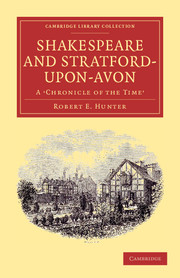THE TERCENTENARY CELEBRATION: its origin, formation of the Committee, and history of their labours
Published online by Cambridge University Press: 29 August 2010
Summary
No people can appreciate more highly the possession of an honourable distinction than the inhabitants of Stratford-upon-Avon. Not encumbered with the questionable blessing of poetic propensities in themselves, they, nevertheless, view with keen perception and enlarged comprehension the genius of Shakespeare. Proud of their town, to which his great name has bequeathed a world-wide celebrity, they have invariably felt that as inhabitants thereof they had special duties to discharge towards his memory. His remarkable attachment to Stratford contributes not a little to their estimate of the honour he conferred upon the town, and largely accounts for their abiding anxiety to prove to the empire and the world that they understand the responsibilities as well as the honours of their position. Such seems to me to have been the feeling of Stratfordians time out of mind, although it is not many years since active steps began to be taken for securing to the nation and preserving from decay the place of his birth and residence. The feeling of respect for his memory has ever been deep, broad, and general. It only required Garrick to unfurl the flag of Shakespeare in order to arouse the town and attract around him the county a hundred years ago. The jubilee of 1827 formally transferred from the adherents of Garrick to their children that Shakespearian enthusiasm they had witnessed amongst their relatives, and which blended with their earliest recollections ; and the celebration of 1830, with its royal, although nominal patronage, and its splendid pageantry, is treasured with pleasurable remembrance by every inhabitant of Stratford whose memory extends to the event.
- Type
- Chapter
- Information
- Shakespeare and Stratford-upon-AvonA 'Chronicle of the Time', pp. 87 - 240Publisher: Cambridge University PressPrint publication year: 2009First published in: 1864

